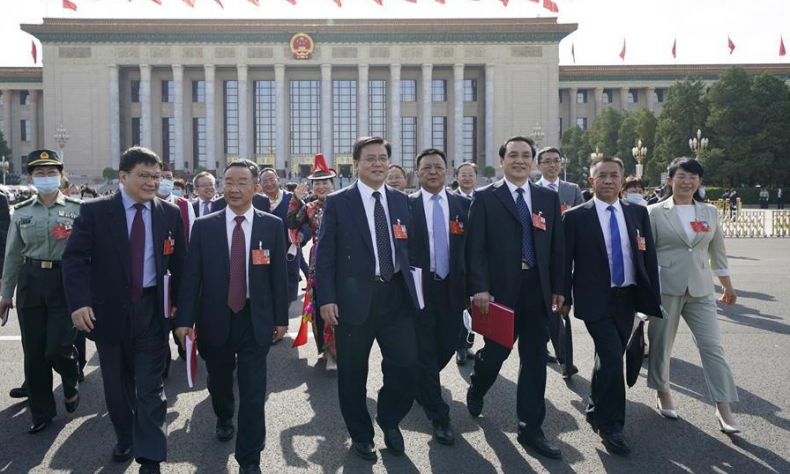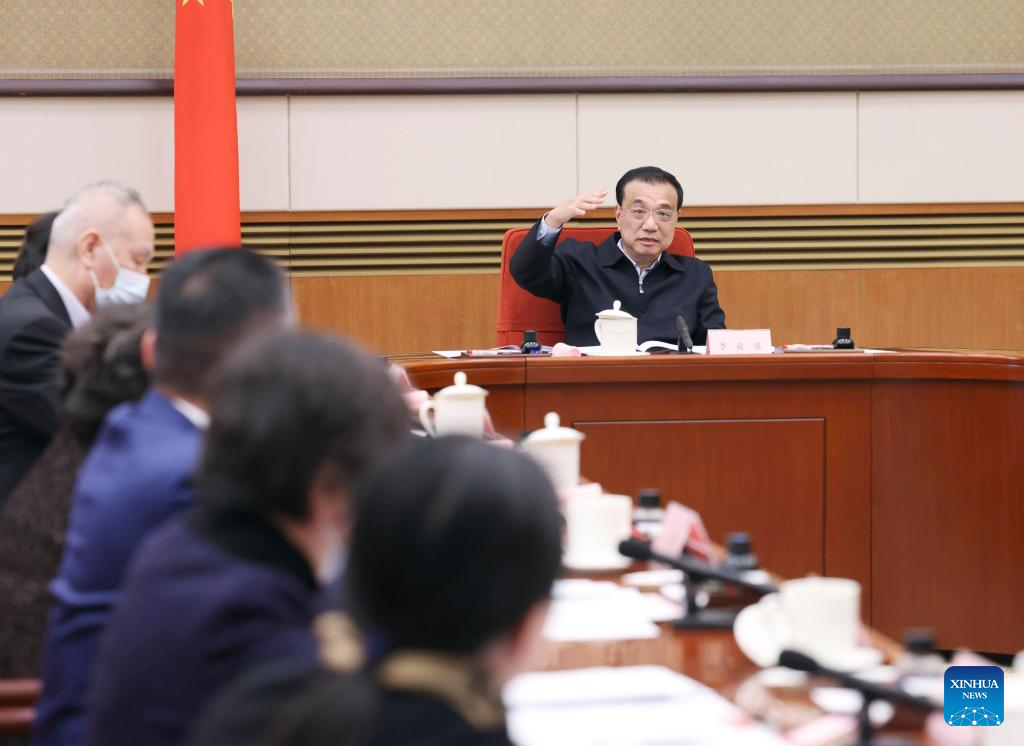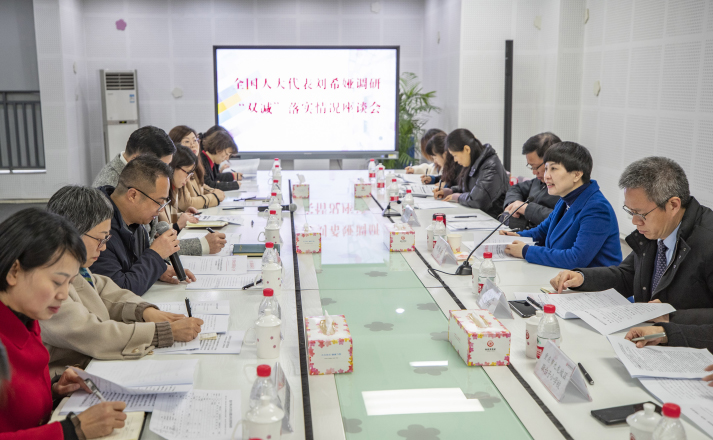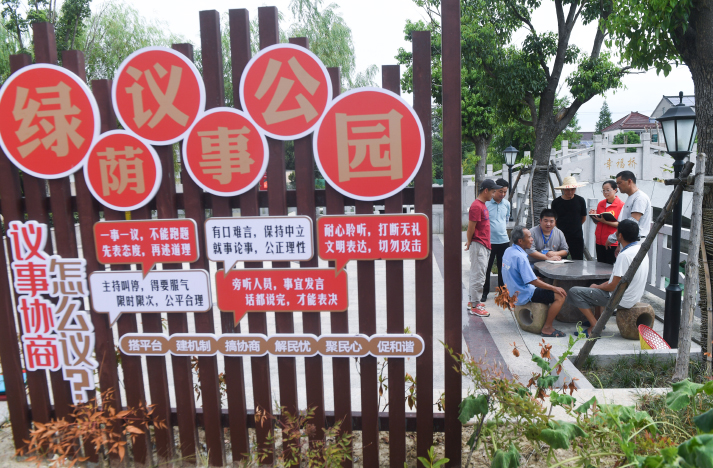What to Expect When China’s National Legislature Convenes in March

The National People’s Congress (NPC) deputies serve as a link connecting government and public.
On February 6, Qin Yanbei, general manager of a private company, attended a special meeting in China’s capital where he met Premier Li Keqiang. Li chaired the seminar, soliciting opinions on the draft government work report, which reviews the government’s performance in 2022 and outlines priorities for the coming year.
Qin’s company, in Ningbo, Zhejiang Province, manufactures and sells household items such as toys, festive decorations, candles and lamps. During the gathering, he shared his suggestions drawn from the perspective of his work, such as further relieving the financial difficulties of small and medium-sized companies, and increasing subsidies for research and development projects of these enterprises.
Noting the challenges private companies face in China, Li urged more efforts to stabilize the economy and boost economic recovery.
Aside from Qin, representatives from a range of other fields also expressed their thoughts and opinions, including Wang Wei, a research fellow with the State Council Development Research Center, He Yaling, a physicist at the Chinese Academy of Sciences, actor Zhang Yi, and four-time Olympian Xu Mengtao, as well as Dong Yan, an employee of a village clinic on the outskirts of Beijing, and Zhao Guang, a farmer from an agricultural cooperative in Inner Mongolia Autonomous Region.
Similar gatherings take place every year in the lead-up to the annual session of the National People’s Congress (NPC). This year’s session will get underway on March 5 in Beijing. The NPC is the highest state organ of power in China, composed of deputies elected from 35 electoral units.

The premier has also heard suggestions from representatives of China’s non-communist parties, the All-China Federation of Industry and Commerce, and persons without any party affiliation. Their suggestions will be considered or included in the government work report to be delivered by the premier at the session’s opening meeting.
There is an ongoing online opinion-seeking campaign as well, inviting the general public to offer advice and suggestions. This is a way people, regardless of social or professional status, can participate in their country’s decision-making process.
“It is an example that demonstrates how China’s [whole-process people’s] democracy covers all sectors of society,” Zhou Shaolai, Deputy Dean of the School of Government under the University of Chinese Academy of Social Sciences (UCASS), told Beijing Review. Whole-process democracy sees Chinese citizens engage in democratic elections, consultations, decision-making, management and oversight according to the law.
The system at work
The system of multi-party cooperation and political consultation under the leadership of the Communist Party of China (CPC) is a basic political system of China.
In October 2022, the most recent CPC National Congress, or the highest leading body of the Party that convenes once every five years, laid out the main objectives and tasks for the next five years. These include high-quality economic development, reform and opening up, further enhancing the institutions, standards, and procedures of the country’s whole-process people’s democracy, ensuring per-capita income grows in step with economic growth, and improving the urban and rural living environments.
“Political parties in many Western countries usually represent the interests of a group of people, while the CPC works for the wellbeing of all Chinese,” Chai Baoyong, head of the Institution of Intraparty Rules and Regulations and State Supervisory Studies under the UCASS, told Beijing Review.
The blueprint mapped out during last October’s 20th CPC National Congress will be reflected in this year’s government work report, Chai added. And the latter will be deliberated at the upcoming NPC session.
The annual gatherings of the NPC and the National Committee of the Chinese People’s Political Consultative Conference (CPPCC), the country’s top political advisory body, are among the most important political events in China and commonly known as the Two Sessions.

Tangible transformation
At the annual legislative session, NPC deputies discuss plans for national development and issues affecting people’s lives. The suggestions they put forward are submitted for meticulous review before being included in the policies of related state organs and government departments.
“I have served as a representative of construction workers, especially those who come from relatively poor villages, in the hopes of further improving their living and working conditions. I will continue to do so at the upcoming NPC session,” Zou Bin, an NPC deputy and a quality control manager at China Construction Fifth Engineering Bureau in Hunan Province, said.
Zou has witnessed firsthand an increasing commitment to vocational training and improved competence of the construction workforce. “Governments at different levels have been coming up with policies to train people who aren’t academically inclined as technicians skilled at using new technologies to meet the demand of the country’s economic and industrial development. We also have more and more access to free training and allowances,” Zou told Beijing Review.
Chai added China’s major policies and decisions are not rubber-stamped during the annual legislative session; they need to undergo several rounds of public solicitation, discussion and revision. “It’s a long incubation process,” he said. “The reports presented to the public at the NPC session are relatively mature. But still, modifications will be made after participants have discussed them.”
NPC deputies serve as a link connecting government and public. After the NPC receives deputies’ proposals, it will transfer each suggestion to the related government departments, which will subsequently provide feedback to the deputy who originally submitted it.
“More deputies should be elected from the most basic levels of different social sectors and organizations. As they are from the public and closer to the public, they are better able to express the most pressing needs,” Chai said, adding the country needs to continue improving the deputies’ capability to make the concerns and suggestions of people they represent heard.
“During our field research, we saw many provinces increasing their channels for people to participate in political affairs,” Zhou said. For example, at villagers’ meetings in some places in Sichuan Province, locals discuss solutions to their farming difficulties; in Leqing, Zhejiang, residents can attend online and offline hearings where government officials share their latest work updates and accept feedback from the public.
Chai added the annual NPC session can also serve as a platform to inform people about what the deputies can do for them, and how every individual’s input can make a difference.
Approximately 30 percent of 13th NPC deputies are officials, while workers and farmers account for less than 20 percent, but their proportion has been on the rise.
President Xi Jinping was elected deputy to the 14th NPC at a session of the Jiangsu Provincial People’s Congress in January. He had been nominated as a candidate by the central authorities.

Hot topics
The proposed agenda items for the First Session of the 14th NPC this year include routine tasks such as reviewing the annual work reports of the Central Government, the NPC Standing Committee, the Supreme People’s Court and the Supreme People’s Procuratorate, and deliberating on the annual plan for social and economic development, as well as the plans for central and local budgets.
Lawmakers are also slated to review a draft amendment to the Legislation Law, which regulates the legislative process. In addition, the 14th NPC is expected to elect and appoint leaders of state institutions during this session. The formal agenda will be adopted shortly before the session begins.
The CPPCC National Committee will also elect a new leadership this year.
Zhou believed one of the focuses of this year’s NPC session will be on the economy. “Following a three-year-long battle against COVID-19, economic recovery and employment are the government’s top priorities,” he said.
In February, the International Monetary Fund projected that China’s economy will grow by 5.2 percent in 2023, 0.8 percentage points higher than its forecast in October last year. It further estimated that China’s economic growth will hit 4.5 percent next year.
“Boosting consumption is another key issue for this year’s NPC session. It is crucial to boost consumer and market confidence and improve overall expectations for the future,” Chai said.
Another hotly anticipated topic is that of senior healthcare. Official estimates show that China will become a severely aging society by 2035, with the number of people aged 60 and above reaching more than 30 percent of the overall population.
NPC deputy Chen Xubin has been paying close attention to this topic. “The aging society has put considerable pressures on the country’s pension system, especially for those seniors in poor health.”
He suggested a new type of nursing home, which functions both as a hospital and as a traditional old age home, be established to streamline the country’s overall senior healthcare system. These new homes would integrate disease prevention, treatment, nursing and hospice care, and would mainly be designed for senior citizens who are sick and alone. His suggestions received positive feedback from several related authorities, including the National Health Commission, the Ministry of Finance and the National Healthcare Security Administration.
 Facebook
Facebook
 Twitter
Twitter
 Linkedin
Linkedin
 Google +
Google +










